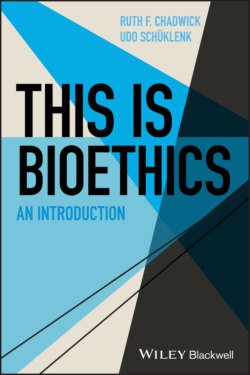Читать книгу This Is Bioethics - Udo Schüklenk, Ruth F. Chadwick - Страница 31
3.2 Who Can Claim to be a Bioethicist?
Оглавление3.11 This is a trickier question than you might think. Unlike medicine or nursing, bioethics is not a profession28. We agree with Bullock and Trombley that ‘a profession arises when any trade or occupation transforms itself through the development of formal qualifications based upon education, apprenticeship, and examinations, the emergence of regulatory bodies with powers to admit and discipline members, and some degree of monopoly rights’ (1999, 689). There are no statutory boards regulating the affairs of bioethicists. Bioethicists certainly have no monopoly powers like doctors, for instance, when it comes to the right to prescribe medication. When you consider the earlier mentioned events that gave rise to bioethics in the United States, you likely won’t be surprised to learn that academics from a number of disciplines were involved in thinking about some of these normative challenges. Among the founders of bioethics were, of course, philosophical ethicists, but there were also, and quite prominently so, Christian ethicists, legal professionals, health care professionals, sociologists, political scientists, even historians. Christian bioethicists obviously have different conceptual modi operandi than secular bioethicists or bioethicists coming from a legal background. It is worth keeping in mind that no single academic discipline ‘owns’ bioethics. Empirical sociologists have become increasingly active in the field, engaging in both qualitative and quantitative work on bioethical issues, ranging from the rights and wrongs of abortion, reproductive cloning and euthanasia to any number of other issues. When queried they may or may not wish to identify with the label ‘bioethicist’, but there are ongoing and important debates about the role of empirical evidence in ethical decision‐making and about how the disciplines of Sociology and Philosophy can and should work together. Clearly empirical facts about perceptions or attitudes do not determine what is right. Nevertheless, data about what is regarded as acceptable can and do influence what is politically feasible, challenge the universal applicability of certain policies in the light of cultural differences, and for some, challenge the very possibility of universal ethical principles in ethics.
3.12 A lively debate continues among people working in the field about the question of ‘who is a bioethicist’. Today specialized programs exist in universities that award doctoral degrees in bioethics. For the purpose of this volume we are looking specifically at how philosophical ethics bears on bioethical questions.
3.13 However, it is worth noting that, as in any evolving field, bioethicists have expanded the scope of their activities. The field continues to grow in leaps and bounds, both with regard to academic subject matters as well as with regard to efforts to professionally accredit the activities of subsets of bioethicists. Extensive efforts are underway to provide accreditations to clinical ethicists, that is ethicists substantially involved in ethics consultations at the (hospital) bedside. The American Association for Bioethics and Humanities29 (ASBH) has taken the lead on this subject matter and produced handbooks on core clinical ethics competencies and related matters.
